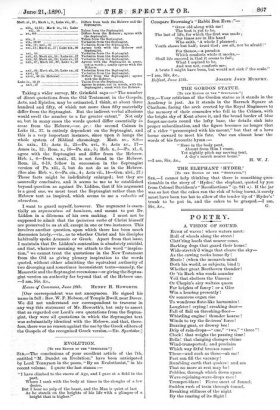THE SEPTUAGINT THE MAIN SOURCE OF NEW - TESTAMENT QUOTATIONS.
[To THE EDITOR OF THR " SPECTATOR."] SIR,—In the Spectator of the 14th inst., an anonymous. correspondent calls in question my statement and your own,_ that the greater portion of the quotations from the Old. Testament in the New are directly taken from the Septuagint_ He does so ex cathedra, and apparently writes as if the matter had not been the subject of profound investigation for many years and at many hands. Surely the question does not admit of any doubt at all, and the test can be applied with the greatest possible ease. I prefer to quote the words of an,. acknowledged authority on the Septuagint, the late Mr. Grinfield. He says :—" Nearly all the quotations made by Jesus himself from the Old Testament are taken verbatim from the Septuagint, and occasionally, where they differ, from the Hebrew (see Matt. xv., 8-9)."
As the matter is of some importance, in view of the con- troversy raised by Dr. Liddon, perhaps you will allow me to transcribe the following list of quotations used by Christ him- self, from a paper in the Quarterly Tournal of Prophecy for October, 184914—
Mattiv., 4; Luke iv. 4 Verbatim from the Septuagint. iv.. 6 (by Satani Taken from the Septuagint. „ iv., 7 Verbatim from the Septuagint.
„ iv., 10 Taken from the Septuagint. „ Ix., 13; xia., 7 Verbatim from the Septuagint.
Differs from both the Hebrew andthe Septuagint.
Taken from the Septuagint. Differs from the Hebrew ; agrees with the Septuagint. Taken from the Seel eaglet.
Verbatim from the Septuagint. Verbatim from the Septuagint. Agrees both with the Hebrew and Septuagint. Verbatim from the Septuagint. Verbatim from the Septuagint. Verbatim from the Septuagint. Agrees with the Septuagint in sense, not in words ; nearly agrees with the Hebrew.
Verbatim from the Septuagint. Verbatim from the Septuagint.
Differs from the Septuagint ; agrees with the Hebrew.
Taken from the Septuagint. Agrees in sense, not in words, with the Septuagint ; exact with the Hebrew.
Taking a wider survey, Mr. Grinfield says :—" The number of direct quotations from the Old Testament in the Gospels, Acts, and Epistles, may be estimated, I think, at about three hundred and fifty, of which not more than fifty materially differ from the Septuagint. But the indirect verbal allusions would swell the number to a far greater extent." Not only so, but in many cases the words quoted differ essentially in sense from the Hebrew,—ex. gr. : the second Cainan in Luke iii., 37, is entirely dependent on the Septuagint, and this is a very important instance, since upon it hangs the whole system of Biblical chronology. Matt. xv., 8-9— Is. xxix.., 13 ; Acts ii., 25—Ps. xvi., 8 ; Acts xv., 17— Amos ix., 12 ; Rom. x., 18—Ps. xis., 5 ; Heb. x., 5—Ps. xL, 6, agree with the Septuagint and differ from the Hebrew. Heb. i., 6—Deut. xxxii., 43, is not found in the Hebrew. Rom. iii., 8-18, follow in succession in the Septuagint version of Ps. xiii., 3, but do not do so in the Hebrew. (See also Heb. v., 6—Ps. cix., 4 ; Acts vii., 14—Gen. xlvi., 27.) These facts might be indefinitely enlarged; but they are assuredly conclusive, and it seems to me to be established beyond question as against Dr. Liddon, that if his argument is a good one, we must treat the Septuagint rather than the Hebrew text as inspired, which seems to me a reductio ad .absurdum.
I want to guard myself, however. The argument is essen- tially an curgumentum ad h,aminern, and meant to put Dr. Liddon in a dilemma of his own making. I must not be supposed to admit that the ipsissinzaverba of Christ himself are preserved to us at all, except in one or two instances. This involves another question, upon which there has been much discussion lately,—viz., as to whether Christ and his disciples habitually spoke Aramaic or Greek. Apart from that issue, I maintain that Dr. Liddon's contention is absolutely suicidal, and that, whatever meaning we attach to the word " inspira- tion," we cannot treat the quotations in the New Testament from the Old as giving plenary inspiration to the words quoted, without either admitting the equivalent authority of two diverging and sometimes inconsistent texts—namely, the Masoretic and the Septuagint recensions—or giving the Septua- gint version an authority far beyond that of the Hebrew one. —I am, Sir, &c.,
Matt. xi., 10 ; Mark i., 2 ; Luke vii., 27
Mil, 14151 Mark iv., 12; Luke
vii., 10 xv., 8-9 xix., 5 xis., 18-19
• 19 ; zzii., 39
:M.,13; Mark xi., 17 ; Luke mi., 46 xxi., 16
zzii 42; Mark Mi., 10 ; Luke xx., 17 • 32; Mark xii, 26 ; Lake xx., 37
xxii., 37; Mark :ft, 30; Luke x., 27 xxii., 44; Mark xii, 36; Luke xx.,42 xxvi., 31 . xxvii., 46 Hebrew) Lake iv., 18-19 „ , 37
11
House of Commons, June 18th. HENRY H. HOWORTH.
[Our correspondent was not anonymous. He signed his name in full : Rev. W. F. Hobson, of Temple Ewell, near Dover. We did not understand our correspondent to traverse in any way this statement of Mr. Howorth's, but only to assert that as regarded our Lord's own quotations from the Septua- gint, they were all quotations in which the Septuagint text was substantially identical with the Hebrew, and that, there- fore, there was no reason against the use by the Greek editors of the, Gospels of the recognised Greek version.—ED. Spectator.]



































 Previous page
Previous page